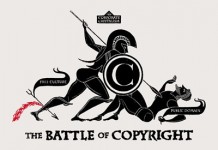The Culture, Media and Sport Committee of the UK House of Commons has just released its latest responses to the Independent Review of Intellectual Property and Growth commissioned by the current UK government in 2010 from Professor Ian Hargreaves (the so-called Hargreaves Review) and completed in 2011. And among its overwhelmingly negative conclusions, and its recommendations, it recommends “that the maximum penalty for serious online copyright theft be extended to ten years’ imprisonment.”

According to the latest UK figures available (2011) from the Ministry of Justice, the average custodial sentence for rape “was in excess of eight and a half years,” which apparently is higher than the average prison sentence for manslaughter. So yes, you read that right: The Committee’s MPs believe that online copyright offenders should be punished more severely than rapists.
The Committee’s conclusions about the Hargreaves Review are so interesting – in the Chinese sense of “may you live in interesting times” – that they’re worth quoting in full:
“Following all the evidence we have received, we think Hargreaves is wrong in the benefits his report claims for his recommended changes to UK copyright law. We regret that the Hargreaves report adopts a significantly low standard in relation to the need for objective evidence in determining copyright policy. We do not consider Professor Hargreaves has adequately assessed the dangers of putting the established system of copyright at risk for no obvious benefit. We are deeply concerned that there is an underlying agenda driven at least partly by technology companies (Google foremost among them) which, if pursued uncritically, could cause irreversible damage to the creative sector on which the United Kingdom’s future prosperity will significantly depend.”
As a Brit writer, I’m certainly very happy that the UK House of Commons believes that the country’s future posterity significantly depends on me and my ilk. But I’m less persuaded that the UK creative sector somehow is expected to contribute more than technology companies to the country’s future wealth.
The Committee is also highly critical of the Hargreaves Review’s position on new copyright exemptions: “We are not persuaded that the introduction of new copyright exceptions will bring the benefits claimed and believe that generally the existing law works well. We recommend that the introduction or amendment of copyright exceptions should be contemplated only following detailed impact assessments and after proper parliamentary scrutiny on an individual basis.” I assume they propose detailed impact assessments and proper parliamentary scrutiny along the lines of their decision to advocate ten years in prison for file-swapping teens.
The original UK legislation being used as a benchmark for this recommendation, the Copyright, etc. and Trade Marks (Offences and Enforcement) Act 2002, replaced a maximum two-year prison sentence with one of ten years. In the case of Richard O’Dwyer, the UK program writer pursued by the US authorities for alleged offenses of conspiracy to commit copyright infringement and criminal infringement of copyright, the maximum sentences for these offenses – ostensibly more serious than the straightforward online piracy tag in the Committee recommendations – were only five years. But I don’t see any move by the Committee to bring its sentencing recommendations into line even with media-friendly US law.
The Hargreaves Review has also attracted heavy criticism from Richard Mollet, chief executive of the Publishers Association, in The Bookseller, who said that the Committee’s response sums up “everything which is wrong with the government’s policy on copyright.”
The US Motion Picture Association of America (MPAA) has already been under fire for its apparent moves to recruit fake supporters for O’Dwyer’s extradition in the UK. It seems like the same Big Media attitudes and interests are at work on the other side of the Atlantic too.































